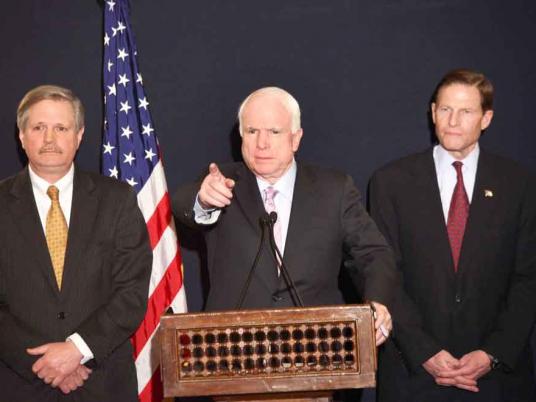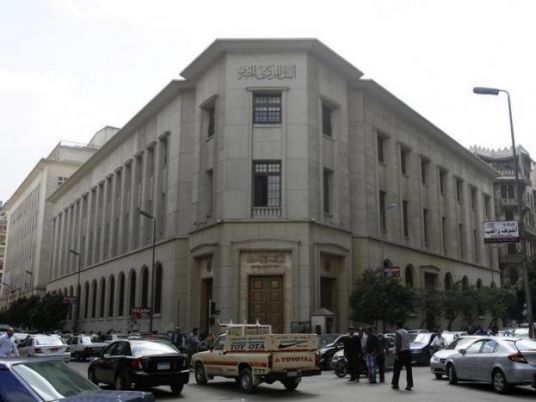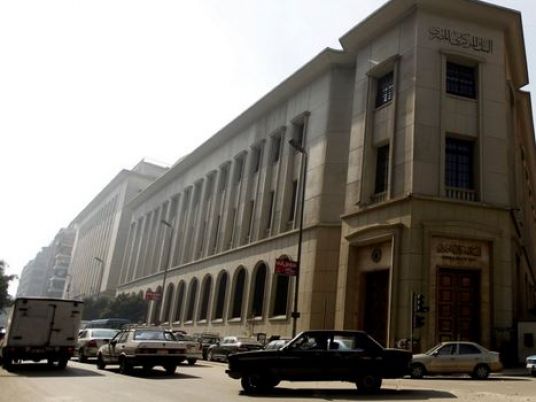There’s been a lot of talk since the revolution. In one of the most important discussions I’ve seen so far, lawyer Nasser Amin sat for a televised interview with well-known dissident journalist Ibrahim Issa to discuss the establishment of truth and reconciliation committees in other revolutionary contexts. Amin stressed the need to implement radical reforms in three areas: security, media and the judiciary. If we ponder for a moment the limited changes that have take place in these institutions, along with the fact that many figures from the old regime still remain, we’ll realize that our revolution is not going down the right path. The interview underscores the necessity of going back to Tahrir.
Some argue that many who are calling for Friday’s demonstration have different, and sometimes contradictory, demands — some of which are quite dangerous. Leaders of the Muslim Brotherhood portray all those going to Tahrir as seeking to change the current roadmap for the transitional period. The protesters, says the Brotherhood, want to first elect a constituent assembly to draft a new constitution and then hold presidential and parliamentary elections. I personally have reservations about this demand because it does not respect the results of the referendum on the constitution in March, according to which a majority of citizens chose the current roadmap. I know many others who share my views but will still participate in Friday’s demonstration.
Calls to change the current roadmap are no more than an angry reaction to the policies of the Supreme Council of the Armed Forces (SCAF). Would such demands have been raised if SCAF had made sure to represent all political currents in the constitutional amendments committee, rather than provoke people by only selecting a Muslim Brotherhood representative? The selection of Brotherhood member Sobhy Saleh raised a great deal of skepticism about a possible alliance between SCAF and the Muslim Brotherhood.
It would have been better if a real dialogue had taken place between SCAF and representatives of all political forces over important legal steps, like the constitutional declaration and the Political Rights Law. Instead, Egyptians were presented with a fait accomplit. But revolutionary forces will not easily adopt the logic of the majority except within a comprehensive democratic framework that protects minority rights and does not move Egypt from one authoritarian regime to another, whether it is under the banner of religion or money.
To those who worry about Friday’s protest, I urge you to let go of the anxiety and fear and put yourself in the shoes of those who are angry. One man who was injured during the revolution called into a TV talk show hosted by Mahmoud Saad to share embarrassing details about murderers from the security forces who have not yet been put on trial. Many of those injured during the revolution have spoken with me on air about the pressures that they’re facing to withdraw their complaints against the former Interior Minister Habib Al-Adli and the officers accused of murdering and attacking protesters. One person even confessed to me that he received LE 20,000 to withdraw his complaints because the officer who shot him is still serving in the interior ministry.
Revolutionaries are dealt with more firmly than necessary. On the other hand, there is a great deal of leniency in dealing with extremists. There is also much sluggishness in confronting Egypt’s security situation. Despite the fact that military leaders have said on more than one occasion that they have solutions for this problem, we have yet to see these solutions. These is also a stubborn insistence on keeping inefficient officials, like Yehya Al-Gamal and Sami Al-Sherif, in their positions despite the fact that SCAF bears the consequences of their mistakes. SCAF needs to relieve itself of these burdens rather than make the same mistakes when appointing governors, university presidents and deans, and heads of municipal councils.
The constitutional declaration represents a new legal framework for legal and political decisions in the interim period. SCAF has a plethora of legal experts who can find legal ways to reduce the anxieties that have prevailed across the country. But there must be the political will to do so. Their insistence on not enacting certain new laws, including ones that would allow the trial of Mubarak and his men for political corruption, on the grounds that this should be the responsibility of the next parliament is odd since SCAF is already passing new laws in other areas without waiting for the next parliament.
Are all these problems not sufficient grounds for a new wave of anger?
The unity of the military as an institution is in the interest of all Egyptians. When we criticize SCAF, we do so because it has become a ruling political force that manages the affairs of the country. The military currently plays a political role that it might not be interested in. But ruling a country means the army must listen to opposing perspectives, and not just those that are the closest to its own positions. If only SCAF had developed strong channels of communication with revolutionary forces, we would not have reached this unfortunate situation.
Translated and abridged from the Arabic Edition.




